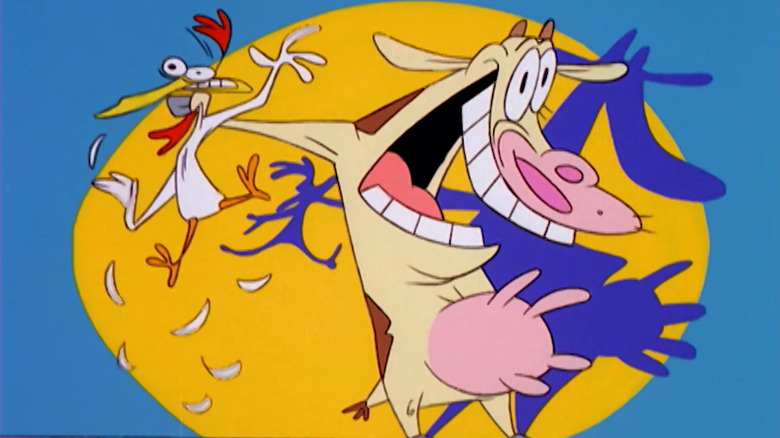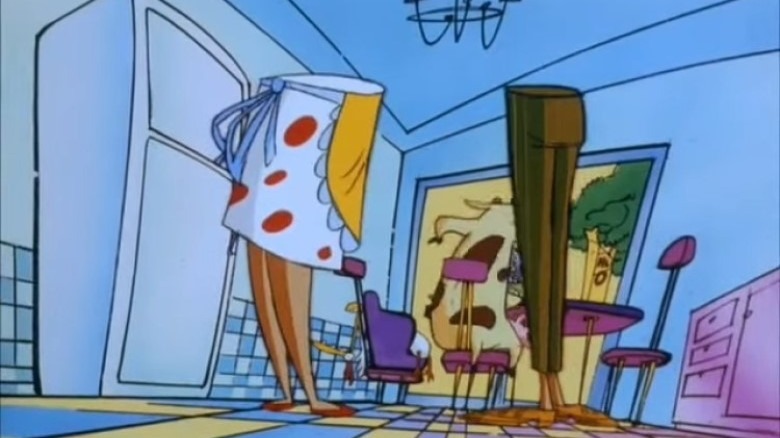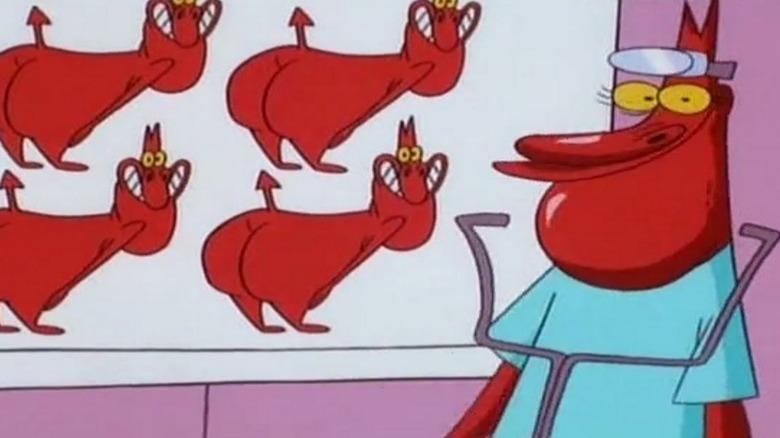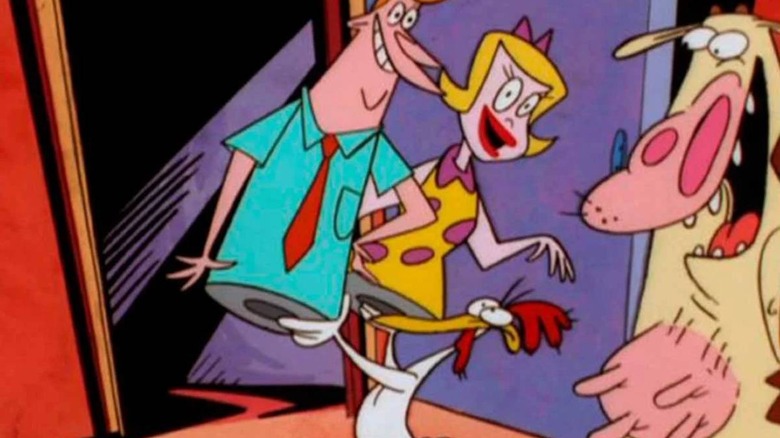Cow And Chicken Creator David Feiss Explains His Original Idea For The Show And Network Notes About The Devil [Interview]
(Welcome to My Most Ridiculous Note, a series of interviews in which animators talk about the weirdest and funniest notes they received from studio executives.)
The early days of Cartoon Network were a great place for weird and exciting cartoons. Once the network started airing original programming, shows like "Dexter's Laboratory," "Johnny Bravo," and "Courage the Cowardly Dog" delivered fun shows aimed at kids, with oftentimes bizarre imagery or adult situations that could be appreciated by audiences of all ages. In those early years, however, no show was as weird as "Cow and Chicken."
The show followed the surreal adventures of Cow and Chicken, two talking animal siblings, as they got into wild plots with the devil, who wanted to scam the siblings. It was also a show that, because of its raunchy art style and having the actual naked devil as a major character, many kids (including me) were not allowed to watch when it first aired. Still, it has endured thanks to strong voice acting performances, sharp writing, and a unique art style.
To celebrate the show's 25th anniversary, we spoke to "Cow and Chicken" creator David Feiss about turning a bedtime story into a cartoon, adding jokes for adults into a kids show, and studio executives being very adamant about the word "manure."
Leggy parents
According to Feiss, he first came up with the idea of a talking cow and chicken a few weeks before pitching it to Cartoon Network. Originally it was a bedtime story Feiss came up with for his daughter after being too tired to turn the light on to read an actual book one night. After telling the story, he drew it out like a book to continue telling his daughter, while also using that same book to pitch to "What a Cartoon!" as a short it was turned into a show.
"In the story that I told my daughter I had [Cow and Chicken] as friends, they grew up together," Feiss told us. "Then Chicken left after high school and forgot about Cow and then comes back at the end and they reunite and they were best friends forever." Once Cartoon Network got involved, Feiss decided it was better for the story if they were brother and sister. "I think it's sillier," Feiss added.
But a show about kids needs parents, and Feiss took a page out of old "Tom and Jerry" cartoons to deliver arguably the funniest running gag in "Cow and Chicken." You see, because "Tom and Jerry" is told from the point of view of the cat and mouse, the adults are only seen from the waist. "And my joke was that they don't have tops. They're just legs," Feiss said, and we even see that briefly at the end of the pilot episode. "Later in the series, I never showed the top. It didn't go up, but I would do things like [...] their shadow would go halfway, you'd see just the legs then it would stop. And they would do things with their feet that usually use your hands, like opening up a door with their foot, writing a letter with their foot, or pouring orange juice."
A devilish red guy
The other big element Feiss added to the show was its antagonist. The way he tells it, the character came to him in a dream, and he wrote it down and later put it in the pilot, dialogue and all. When we first meet him, the big, naked red guy proclaims: "Hello, it's me, the Devil. I stand for all that is bad. Also, I'm naked," which is exactly what he said in Feiss' dream. Though the network liked the show and the characters, including the devil, things changed a bit when the pilot got picked up for series.
"They said, 'You can't call him the devil,'" Feiss recalled. "'He can look exactly as he is. He can still be naked. He can still walk on his butt, he can do all these things, but you just can't call him the devil.' Which was, I think, a bonus, because it was funnier just to come up with a new name for every episode. Generic Red Guy, but specifically Officer Penskofsky or Ben Pants."
The Red Guy, as he came to be known, became an integral part of the show. Each episode, which had bizarre, jokey titles, involved the Red Guy coming up with a deranged plan to trap Cow and Chicken.
"Sometimes an episode would start with a title," Feiss explained. "Like 'The Orthodontic Police' was based on my feelings of having braces on my teeth when I was a kid, about the tightening of the teeth. And then I was extrapolating like, it would be funny if they actually had motors and pulleys and like, it was almost a torture device. And then the idea that the Red Guy was stopping people at random and putting braces on their teeth against their will came about."
Creator-driven cartoons and sacks of notes
"Cow and Chicken" came out at a time when TV animation was changing and animators had a much bigger say in what stories were being told. From Genndy Tartakovsky to Craig McCracken, it was a time for experimentation, and Feiss credits one particular Nickelodeon show with leading the charge.
"I look to 'Ren and Stimpy' as what opened the door for everybody else. Because before that, young creators weren't looked to bring the product into the studios [...] It was mostly executives that would dictate 'we want a show about this.'"
And much like "Ren and Stimpy," Feiss would add jokes to "Cow and Chicken" that went over the kids' heads and were mostly aimed at adults. "I was thinking about kids, but I was mostly thinking about older people that would be watching and would enjoy it," Feiss explained. He pointed at the "Rocky and Bullwinkle" cartoon as an example of a show that was funny to kids, but also had some more mature subjects, was mostly about the Cold War, and was written for adults.
Though the studio didn't mind the raunchy humor or the inclusion of the devil as a character, they still had plenty of notes. Feiss recalls one episode in which they had a pig talking about a sack of manure. "[The executives] said, 'Well, you're trying to say a 'sack of s***.” And I was not trying anything, I just like the word manure. I thought that was funny: a sack of manure."
It's been 25 years since the Red Guy started trying to scam a young cow and chicken, but "Cow and Chicken" remains a funny, creative cartoon evocative of the implosion of creator-driven cartoons of the '90s.



